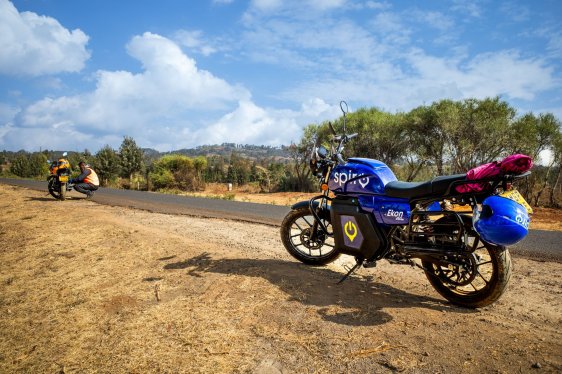Africa’s electric mobility story has often been one of promise over progress. Infrastructure is scarce, power grids are unreliable, and most markets still run on cheap imported motorcycles. But the Dubai-headquartered company Spiro has spent the past two years trying to rewrite that narrative.
The company just announced a one hundred million dollar investment round led by The Fund for Export Development in Africa, the development arm of Afreximbank. This raise marks Africa’s largest-ever EV mobility investment and cements Spiro as the continent’s most aggressive electric motorbike company.
Spiro says it plans to deploy more than one hundred thousand electric bikes across Africa by the end of 2025. This represents a four hundred percent year-over-year jump that underscores its ambition to dominate a category long considered too fragmented to scale.
Spiro’s growth has been dizzying. When CEO Kaushik Burman joined two years ago from the Taiwanese battery-swapping giant Gogoro, the startup had just eight thousand electric bikes and one hundred fifty swap stations spread between neighboring countries Benin and Togo.
Today, it operates in six countries, including Rwanda, Kenya, Nigeria, and Uganda, with over sixty thousand bikes deployed and one thousand five hundred swap stations. At these stations, riders can swap depleted batteries for freshly charged ones. Battery swaps have surged from four million in 2022 to over twenty-seven million this year.
The secret behind that growth is a business model built for Africa’s realities. In African cities, motorcycle taxis, known as boda bodas in Kenya or okadas in Nigeria, move people and goods through congested cities and rural towns alike. Yet for the millions of riders who rely on them, fuel costs are punishing.
These drivers spend ten to twelve hours on the road every day, covering one hundred fifty to two hundred kilometers while paying high fuel costs. At the end of each day, most barely save anything. That is why electric mobility, especially through a battery-swapping model, fits this segment perfectly. They cannot afford downtime and get to save some money.
That is the wedge Spiro is leaning into. According to the company, its electric bikes cost roughly forty percent less upfront than new gasoline models. In Kenya or Rwanda, where a typical gas bike sells for thirteen hundred to fifteen hundred dollars, Spiro’s e-bikes cost around eight hundred dollars and cost about thirty percent less per kilometer, since swapping batteries is cheaper than refueling.
This combination of lower cost and faster payback has made Spiro’s model attractive for taxi drivers. The company claims most riders, who pay a daily fee for access to its energy network, save up to three dollars per day on fuel and maintenance. That is enough to buy another bike or start a small business over time.
Spiro earns revenue from both bike sales and its battery-swapping network. Riders buy or lease a Spiro bike, pick up a charged battery at a swap station, and pay only for the energy they consume. Each swap station houses dozens of batteries that are recharged continuously, ensuring zero downtime. Riders are billed via a proprietary algorithm that measures energy usage.
The network itself is Spiro’s profit engine. By owning the battery infrastructure and charging a small fee per swap, the company quickly achieves economies of scale. In addition to battery swapping, the company is also using renewables and energy storage to ensure its network stays operational even during blackouts.
Spiro’s swap stations are located in gas stations, shopping centers, and even religious institutions. This network is built through partnerships that also create local jobs.
To meet growing demand and increase employment opportunities, the three-year-old startup has established four assembly and manufacturing facilities across Kenya, Nigeria, Rwanda, and Uganda. These plants assemble bikes and key components such as traction motors, controllers, and batteries.
Spiro already assembles batteries in Kenya using its proprietary battery management system and plans to boost local sourcing from thirty percent today to seventy percent within two years. This includes sourcing plastics, helmets, and brake components.
The one hundred million dollar round, including seventy-five million from FEDA and the rest from other strategic investors, will help fund this expansion. It follows more than one hundred eighty million dollars in previous investments, a mix of debt and equity from the Equitane Group, Spiro’s parent company, and Société Générale.
The new capital will go toward expanding Spiro’s swap network, manufacturing capacity, and research and development, as well as launching pilots in new markets like Cameroon and Tanzania.
As it scales, Spiro will face growing competition from other EV startups. But the company argues otherwise. Its competition is the gasoline bike segment, both first and the secondhand bike segment, and the millions of potential riders who do not yet own a bike or lack access to affordable transportation and employment.
Africa has around twenty-five million motorbikes, compared with three hundred twenty million in India, despite similar population sizes. That thirteen times gap shows the size of the opportunity ahead.

